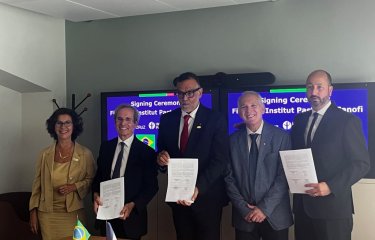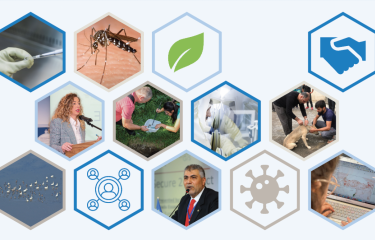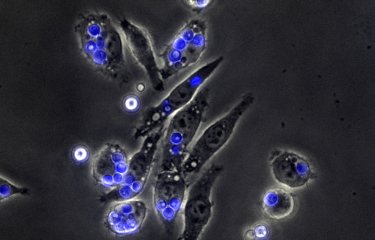Since its creation in 1972, the Institut Pasteur in Côte d'Ivoire is one of the pillars of research and public health in the country and the region. Over the past 10 years, the institute has undergone a major technological shift to become one of the most advanced institutions in West Africa. Interview with Prof. Mireille Dosso, Director of the Institut Pasteur in Côte d'Ivoire.
What makes the Institut Pasteur in Côte d'Ivoire a major player in research and public health in the country?

You have undergone a vast technological modernization of the institute in recent years?
Yes, we started these developments almost 10 years ago. We now have a molecular biology platform of three hundred square meters that allows us to carry out all the advanced manipulations including sequencing. We have a biosafety level 3 laboratory for tuberculosis. And we have built a 1000 m2 biological resource center with an encapsulation station that can store DNA samples at room temperature. It is the only one of its kind on the continent! We are now building a platform on high-risk infectious pathogens that will include the first safety level 4 module in the region. We are also looking for funding to set up facilities for the genomic study of cancers.
A winning bet?
Yes all the way! The modernity of our infrastructure has earned us to be nominated by the West African regional organization of health biobank of the ECOWAS countries. This regional biobank will be inaugurated at the end of the year. We also have requests for samples from international biobanks. These technological developments allow us to be more efficient and attractive, even for young scientists. Last year we welcomed 284 trainees, including thirty doctoral students, a record! These young researchers come not only from Côte d'Ivoire, but also from France, Canada, the United States, as well as from other countries in Africa such as Chad and Liberia. We have achieved some of our dreams to advance science in Africa.
The Institut Pasteur is today a model for African research?
In any case, it is an example that things can change from the inside in Africa. Projects to build the biobank and the platform on high-risk pathogens have been financed to the tune of 8 billion CFA francs by the Ivorian government. We were convinced that these projects were important and achievable here. We were able to find the arguments to persudade the political authorities and they trusted us. It was not won in advance, I am very proud. The modernity of our institute is now attracting many international partners. It is also a positive message for young people, determination can make innovative projects come true.
Interview by Olivier Rescaniere
THE MOST MODERN BIOBANK OF THE AFRICAN CONTINENT
In 2009, as part of the global eradication of poliomyelitis, WHO is asking the Institut Pasteur in Côte d'Ivoire to confine samples and strains of poliovirus. At the same time the CDC in Abidjan wanted to give its collections of samples to the Institut Pasteur in Cote d'Ivoire. The majority of biobanks are then located in the developed countries and the Institut Pasteur in Côte d'Ivoire decides to take up the challenge of building an infrastructure responding to international standards.

With funding from the Ivorian government, the existing structures are rehabilitated and room for up to 22 cryopreservatives tanks of 1000 liters each is constructed. This technique of cold storage is nevertheless costly and does not guarantee the integrity of DNA molecules in the long term. The Institut Pasteur in Côte d'Ivoire has therefore installed an encapsulation station. This fully robotic technique allows the DNA to be stored at ambient temperature over the very long term in the absence of water and air. It is a first on the African continent. In addition to its own biological collections, the Institut Pasteur in Côte d'Ivoire will soon host the samples collected in the epidemiological surveillance of all ECOWAS countries as a regional biobank in the 1000m2 of its biological resources center.
A BSL4 lab to combat high-risk pathogens
In March 2014, the Institut Pasteur thanks to the BSL4 laboratory of the National Reference Center for Viral Hemorrhagic Fevers, confirms the presence of the Zaire species of the Ebola virus (ZEBOV) in a patient sample from Guinea. This is the starting point of an unprecedented international mobilization to stem what will prove to be the most severe Ebola epidemic ever recorded in West Africa. Two years later, in June 2016, when the WHO announced the official end of the epidemic, the figures were sad: at least 28,000 officially declared cases, including more than 11,000 deaths. "Neighboring countries have been hit hard. We had 70 suspect patients but fortunately no confirmed cases. The health infrastructures implemented with the Government and our partners have enabled us to rapidly face the situation" says Mireille Dosso.

The Ivorian authorities are taking stock of the threat to the country and are asking the Institut Pasteur in Côte d'Ivoire to set up a local structure capable of performing the necessary analyzes in the event of an epidemic outbreak of highly virulent pathogens. "For several years now, we had been working on a project to create a center with infrastructure of international standards of containment to conduct research on these extremely dangerous pathogens. The government followed us immediately "explains the Director of the Institut Pasteur in Côte d'Ivoire. The Center for the Study of Emerging Pathogens with Severe Infectious Hazards is expected to be completed by the end of 2018. It will include a a level 3 animal housing facility and insectarium as well as the first P4 laboratory of West Africa to handle the viruses responsible for haemorrhagic fevers. A necessity while Côte d'Ivoire has just undergone a new epidemic of dengue fever and a new case of Lassa fever infection has been confirmed in Nigeria recently.





